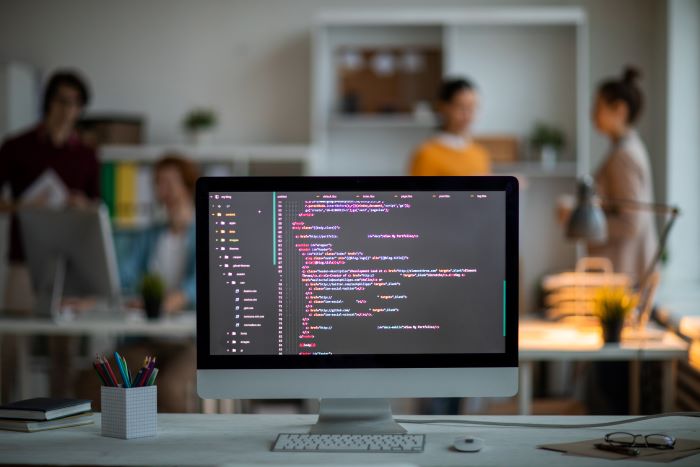In this article, we will explore fundamental concepts such as data protection and artificial intelligence, emphasizing the importance of finding an effective balance between innovation and security in practice.
I'm sure you've come across product suggestions online that seem to anticipate your desires, haven't you? It may seem like magic, but in reality it's artificial intelligence at work. Now imagine this technology handling your personal information at all times.
That's why we'll discuss how this technology captivates us with its predictive abilities, while at the same time imposing on us the crucial challenge of protecting our data.
What is Artificial Intelligence?
A artificial intelligence is a field of computer science that focuses on developing systems capable of performing tasks that normally require human intelligence.
These tasks include learning, reasoning, recognizing patterns, understanding natural language, solving complex problems and making decisions.
What is Data Protection?
Data protection refers to the practices and measures adopted to guarantee the security, confidentiality and integrity of individuals' personal and sensitive information.
This involves implementing policies, procedures and technologies designed to prevent unauthorized access, misuse or unauthorized disclosure of this information.
Laws and Regulations to Keep Your Data Safe
One of the issues that has gained increasing prominence since 2020 is the General Data Protection Law (LGPD), a Brazilian law that establishes guidelines for the processing of personal data in the country.
Its purpose is to guarantee greater control over personal information, imposing obligations on companies regarding the collection, storage and processing of data. The LGPD incorporates various provisions, as presented below:
Art. 42: Companies responsible for processing personal data are obliged to make reparation for pecuniary, moral, individual or collective damage caused to third parties as a result of the processing activity violating personal data protection laws.
Art. 46: Entities responsible for data processing must implement security measures, both technical and administrative, with the aim of protecting personal information against unauthorized access and accidental or unlawful situations of destruction, loss, alteration, communication or any form of inappropriate or unlawful processing.
Art. 48: In cases of security incidents that may entail relevant risks or damage to data subjects, the controller has the obligation to notify both the national authority and the affected data subject of the occurrence.
These provisions reflect the legislation's commitment to ensuring the integrity and protection of personal data, highlighting the importance of transparency and accountability on the part of organizations that handle sensitive information.
Check out the LGPD, also known as Law No. 13.709.
What is the Interaction between Data and Artificial Intelligence?
The relationship between data and AI is crucial to the good performance of AI systems. Below, we present some ways in which these two elements are interconnected:
Data feed
AI relies heavily on data to learn and make decisions. Data is used to train AI models, providing examples and patterns to be recognized.
The more quality data an AI model has during training, the better its ability to generalize and perform specific tasks.
Machine Learning
In the context of threat identification, machine learning uses data to train models capable of recognizing patterns and behaviors associated with malicious activities.
The process involves collecting and pre-processing data, labeling for supervised training, selecting resources, training the model, validating, adjusting, evaluating, and finally deploying the model to identify threats in real time.
Continuous Improvement
AI systems are often designed to be adaptive. They continue to learn and improve as they are exposed to more data over time.
Continuous feedback with real-time data can allow AI to adjust to changing conditions or patterns in the environment.
Decision-making
In many cases, AI is used to make decisions based on data. It can be in image classification, pattern recognition, personalized recommendations, among others.
AI's ability to make informed decisions depends on the quality and relevance of the data used during training.
Iterative feedback
The continuous interaction between data and AI is an iterative cycle. As new data becomes available, the AI model can be updated to reflect these changes and improve its performance.
Ethics and Data Quality
A ethic and artificial intelligence in the use of data is not only limited to the quality of the data, but also extends to transparency and accountability in the decision-making process.
The presence of biases in data can result in algorithmic discrimination, so careful selection and processing of data is essential to ensure that AI makes fair and unbiased decisions.
Artificial Intelligence Applications in Different Sectors

AI certainly permeates a variety of sectors in society. Learn about some of these areas.
Legal
Automated review of legal documents, precedent analysis, legal research and case screening are tasks now streamlined and enhanced by AI.
In addition, the ability to predict judicial outcomes through algorithms contributes not only to greater efficiency, but also to more informed and strategic decision-making in the legal sphere.
Marketing
AI has revolutionized the marketing industry by offering advanced data analysis, content personalization, paid media campaign automation and market trend forecasting.
In addition, AI-powered chatbots are also used for more efficient interactions with customers.
Health
In healthcare, AI is applied to medical diagnostics, drug discovery, treatment personalization, patient data management and health monitoring.
Machine learning algorithms help identify patterns in large data sets, contributing to faster and more accurate diagnoses.
Finance
In the financial sector, AI is used for risk analysis, fraud detection, customer service through chatbots, portfolio optimization, algorithmic trading and market forecasting.
These applications improve operational efficiency and strategic decision-making.
Education
AI in education offers personalization of teaching, adaptation of content based on student performance, automated assessment, virtual tutoring and analysis of educational data.
These technologies help to create more effective and inclusive learning environments.
Retail
Retailers benefit from AI through personalized recommendations, predictive demand analysis, price optimization, customer service automation and inventory monitoring.
These applications improve the customer experience and operational efficiency.
Transportation
In the transport sector, AI is applied to optimized routing, predictive vehicle maintenance, traffic management, autonomous vehicles and demand forecasting.
These technologies contribute to the safety and efficiency of transportation.
Data privacy challenges in the age of AI

In the age of AI, significant opportunities for data protection are emerging, while at the same time crucial privacy challenges are becoming apparent.
Data Collection and Use by AI
The growing reliance on AI algorithms in decision-making raises substantial concerns about the collection and use of personal data.
The challenge lies in the need to balance obtaining information for effective model training without compromising individual privacy and without compromising the rights of data subjects, such as the right to know for what purpose the data is used.
Data Security Risks in AI
The interconnection of systems and the complexity of AI algorithms increase cyber security risks.
Protecting against data breaches, adversarial attacks and the exploitation of vulnerabilities becomes a constant challenge.
Bias and Discrimination in AI
The bias built into AI algorithms represents a significant concern, as it can result in discriminatory and unfair decisions.
The quality of the training data directly influences the impartiality of the models, and a lack of diversity in the data sets can lead to biased results.
Measures to Protect AI Data Privacy
Here are some effective measures to protect personal information.
Privacy By Design (PBD): It is essential that privacy is considered right from the design of the product or service that uses AI. To this end, there are 7 principles that guide this development in order to incorporate preventative measures, rather than after-the-fact solutions.
Data Anonymization: anonymization is a practice that aims to remove or modify personally identifiable information from data sets, preserving the usefulness of the data for analysis and research, while protecting your identity;
Cryptography: the application of cryptographic techniques is essential to ensure security during data transmission and storage. Cryptography transforms data into indecipherable codes without the appropriate key, providing an additional layer of protection;
Data Minimization: Data minimization involves collecting and retaining only the information that is strictly necessary to perform a specific task. Reducing the amount of data stored limits the risks associated with handling it;
Machine Learning with Differential Privacy: this approach incorporates techniques that introduce controlled noise into the data during the training of machine learning models. This protects its privacy, making it difficult to identify specific contributions to the data set;
Privacy and Impact Audits: Privacy audits assess compliance with practices and regulations, while privacy impact assessments analyze the potential impact of data processing operations on individual freedoms and privacy.
Adopting these measures forms a comprehensive approach to ensuring data privacy in the age of AI, promoting trust and compliance with ethical and legal standards.
Data Breach Cases
In the digital age, data breaches pose critical challenges, exposing sensitive information and raising significant concerns about cyber security. Marked by unauthorized access to personal data, these incidents impact companies and users on a global scale. Check out some of the cases.
1. Facebook (2018):

A data breach compromised the information of around 87 million of users, revealing inadequate data-sharing practices with Cambridge Analytica.
2. Equifax (2017):
 The credit reporting giant suffered a breach that exposed personal data, including social security numbers and financial information, of approximately 147 million of consumers.
The credit reporting giant suffered a breach that exposed personal data, including social security numbers and financial information, of approximately 147 million of consumers.
3. Yahoo (2013-2014):

The company announced a series of breaches that affected more than 3 billion of accounts, exposing sensitive data such as names, email addresses and passwords.
4. Marriott (2018):

A breach in the database of the Starwood Preferred Guest program exposed the personal data of approximately 500 million of customers, including passport information.
5. Uber (2016):

Uber faced a data breach that affected 57 million of users worldwide, involving the payment of a ransom to keep the incident secret.
These cases highlight the critical importance of cyber security and data protection in an increasingly interconnected digital world.
The Crucial Role of the Data Protection Officer in Data Security
With the growing emphasis on data protection and the implementation of laws such as the LGPD (General Data Protection Act), the profession of DPO (Data Protection Officer) has become a legal and ethical obligation.
DPOs are specialists in charge of ensuring compliance with data privacy regulations, developing and implementing internal policies, offering training and serving as a point of contact for data protection issues.
This profession is on the rise, reflecting the increasing importance given to privacy and information security in the corporate and regulatory landscape.
Main Questions about Data Protection Officer
In order to answer the main questions on the subject, we had the pleasure of interviewing lawyer Mariana Lopes, a partner at CondoPrivacy. Mariana is a specialist in Data Protection and Digital Law, with extensive experience in LGPD compliance projects for companies and condominiums. In addition, she stood out by completing three of Brazil's best courses on the subject, as well as taking the "Computer Science for Lawyers" course offered by Harvard University.

Check out their valuable contributions below!
1. What is a Data Protection Officer (DPO)?
ML - The DPO (Data Protection Officer) is a position that has been created by data protection laws around the world, including the LGPD. It can be held by a natural or legal person. They act as a data protection watchdog within the company.
2. What is the role and main responsibilities of a DPO?
ML - The DPO must guide teams on how to effectively protect personal data and comply with the law. They must also receive and take action on complaints and communications from data subjects and the National Data Protection Authority (ANPD). It is essential that all actions to comply with the law are documented, as they will serve as proof if the company is questioned about them.
3. In which types of organizations is the presence of a DPO mandatory?
ML - Medium-sized and large companies are obliged to appoint a DPO. Micro-enterprises, small businesses and start-ups will also have this obligation if they have (or if the economic group to which they belong has) a gross revenue higher than that established by law or if they process high-risk data, for example, using AI to make automated decisions. It's important to check with a specialist on a case-by-case basis so as not to fall foul of the law.
4. How does a DPO contribute to compliance with data protection regulations, such as the General Data Protection Regulation (GDPR)?
ML - First of all, the DPO needs to know in which markets the company operates in order to determine which laws must be complied with. Once that's done, it's important to have in-depth knowledge of these regulations, especially the decisions of local authorities, because they are based on practical cases and illustrate in detail the best way to comply with the law. Furthermore, in the case of the GDPR, the DPO must be registered with the European authority and have a recognized certification.
5. What qualifications and skills are essential for a professional to work as a DPO?
ML - You definitely need to have good interpersonal skills, because you will be the person who, to a certain extent, changes the way the company conducts its internal processes, and can generate resistance and dissatisfaction if you don't know how to attract employee collaboration and engagement. They also need to have knowledge of project management and organizational skills, as well as technical knowledge of data protection.
6. How do salaries vary for a Data Protection Officer at different stages of their career, ranging from entry-level to intermediate and advanced experience?
ML - In general, the position of DPO is held by people who already have a certain amount of experience in the area. What most influences salaries is the size of the company, ranging from R$10,000 to R$30,000 per month, according to Michael Page's Brazil 2023 Remuneration Study.
7. How does a DPO balance the implementation of data protection practices with the pursuit of innovation in organizations?
ML - Innovation often increases the risk of harm to data subjects, so it is important to anticipate and reduce these risks, without discouraging or prohibiting innovation. One way of doing this is to apply the principles of privacy by designprinciples, which lead to the implementation of protective measures from the product's conception, i.e. acting preventively.
8. What are the most common challenges faced by a DPO in the current scenario?
ML - The main challenges are related to raising awareness among the company's teams. Most security incidents are caused by human error, i.e. actions by employees themselves that create vulnerabilities. So the challenge is to educate people about best practices and implement data protection governance.
9. What is the role of the DPO in responding to security incidents and data breaches?
ML - The DPO plays an important role, especially before an incident occurs, by simulating crisis rooms with the company's board of directors so that the measures adopted in the event of a data leak, for example, can be established and rehearsed. In addition, depending on the seriousness of the incident, the DPO must inform the National Data Protection Authority and the data subjects of what has happened.
10. How can the role of a DPO impact an organization's privacy culture?
ML - The DPO is primarily responsible for creating a culture of data protection. This is achieved through training, awareness-raising and the development, together with the company's teams, of data governance mechanisms, adapting processes to the law. An important precaution is that the DPO's actions seek to reconcile, if possible, new practices with those already in place, so that there are no sudden changes that make it difficult for employees to adhere to them.
11. How do changes in data protection regulations influence the role of the DPO?
ML - Here in Brazil we are still maturing on a number of issues, because the law is relatively recent and the National Data Protection Authority (ANPD) is carrying out a regulatory agenda. While regulation is still expanding here in Brazil, in Europe there is already a great deal of maturity in this regard and a much larger number of standards and references on how to act in each specific case. So knowing how to research international regulations has a very positive impact on the DPO's work. At the same time, it is important to always access the ANPD's official channels to keep up with new understandings on the application of the LGPD and to guide clients in this direction.
12. What are the best practices to ensure the success of a DPO in their role?
ML - Four important points are: acting freely to make decisions and carry out the work; raising awareness of the company as a whole; recording and proving all compliance; and being technically up-to-date.
13. What are the emerging trends in the area of data protection that a DPO should follow?
ML - Certainly the regulations that combine data protection with the use of Artificial Intelligence.
Conclusion
In this article, it has become clear how important it is to take care of our data, balancing the advance of artificial intelligence with security, both for people and companies.
In the world of online business, protecting data is not just about maintaining privacy, but is fundamental to building and maintaining trust, which will guarantee the success and reputation of organizations.
In this scenario, it is interesting to note how the Data Protection Officer (DPO) is becoming increasingly relevant. This highlights the growing importance of handling information ethically and responsibly.
We hope you enjoyed the article we've prepared for you! To keep up to date with AI and related topics, we invite you to visit the Pareto Blog.



